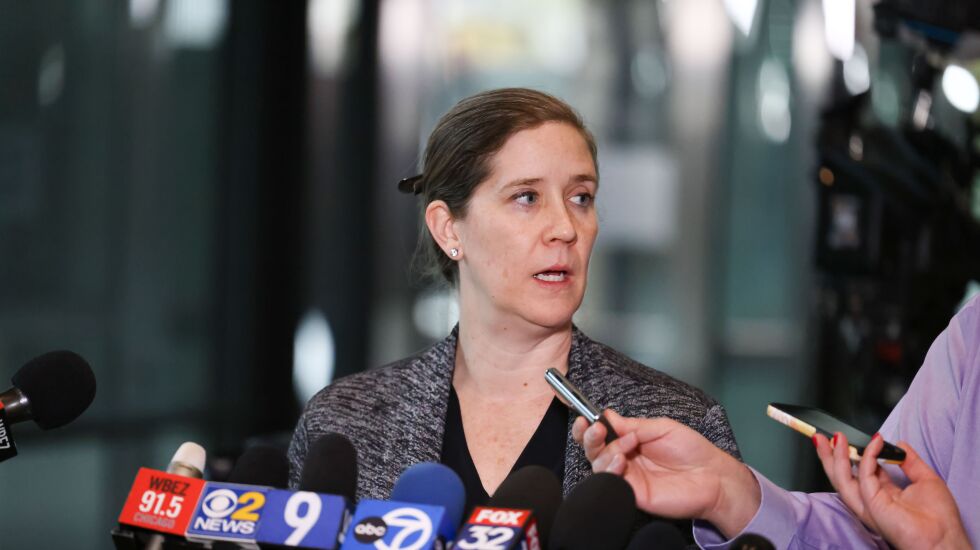
After delivering a resounding guilty verdict in the ComEd bribery trial, several jurors told the Sun-Times on Tuesday they just didn’t buy the defense that it was all legal lobbying.
That didn’t mean it was easy to convict the four former political power players for arranging jobs, contracts and money for allies of Michael Madigan to influence him as crucial legislation moved through Springfield.
During their weeklong deliberations, jurors “ached about” how the allegations crossed the line from legal lobbying into criminal activity, according to the jury foreperson, Sarah Goldenberg.
“The term we reviewed heavily was goodwill, where goodwill is to have those relationships with representatives in the political arena for the benefit of the company you’re associated with. And we felt this went beyond goodwill to ‘intent to influence,’” said Goldenberg, a 34-year-old data analyst.
Goldenberg said she knew little about lobbyists before the trial. “This doesn’t necessarily change my view on lobbying. They are needed and they’re regulated in the government.”
She said Madigan “had heavy influence, and he allowed the people around him to use his power to influence the way companies were behaving and pay money to others to spread his extended reach of influence. I do think he had a heavy hand in how this corruption and coercion took place.
“But if it wasn’t for the actions of the individuals charged, he wouldn’t have any influence,” she added.
Goldenberg, who said she has minimal knowledge of current politics, said deliberations were “detailed.”
“We scrutinized the letter of the law, the judge’s instructions and the evidence presented in court to every inch of detail to make sure we were applying everything appropriately,” she said. “If someone had any reservations, we didn’t push anyone to flip their judgment. We paused to make sure people saw evidence and come to their own fair resolution.”
Goldenberg said she volunteered to be foreperson so that the others on the jury would “have their voice heard.”
“There were a lot of powerful figures in the jury pool, and we were able to really hear everyone’s different side,” she said. “That’s why it took the duration it did.”
Amanda Schnitker Sayers, a veterinarian who lives in Logan Square, said there was agreement among jurors that “lobbying is necessary for our legislators to be educated.”
But she said, “This is not lobbying.”
“The argument that the defense did very well — to try to prove that this was all the normal course of business — did not sit well with us,” Schnitker Sayers said. “And as far as politics goes, this is also, I hope this is not how all politics runs, certainly as a citizen of this state.
“All of us hope that this is not how politics work,” she said. “It should not be how politics work.”
Schnitker Sayers said there were “quite a few” recorded conversations that played a role in the guilty verdict, including one in which ex-ComEd lobbyist John Hooker and Madigan confidant Michael McClain talked about how they conceived the scheme to hire Madigan allies as subcontractors.
“It’s clean for all of us,” jurors heard Hooker saying on the Feb. 11, 2019, call.
“We had to hire these guys because Mike Madigan came to us,” McClain said. “It’s that simple.”
“That did not sit well with all of us, and there were at least three conversations that they kind of talked about how they were expressing their pride in themselves,” Schnitker Sayers said. “They came up with this corrupt structure. So those were ones that definitely stuck out for us.”
Schnitker Sayers also said that former ComEd CEO Anne Pramaggiore’s testimony “did not do her well.”
“She would have been better to admit what she knew and not avoid the questions by saying she didn’t remember,” Schnitker Sayers said. “Because she’s a smart woman, and you know she remembered some of that stuff.”
Another juror, Robert Garnes, a 65-year-old resident of Westmont, said he was struck by how Madigan was a “a very calculating person.”
“He’s been at it a long time. That was the last thing on his mind that he’d get in trouble with this,” said Garnes, who works in IT.
It was obvious people were afraid of Madigan, Garnes said. “I don’t know about you, but I don’t work for people I’m afraid of. You have to stand up to those people and tell them you’re not worth going to jail.”
Garnes said there were a few jurors who held out on voting guilty on some counts, mainly ones about the contracts that were signed and who was responsible.
“Maybe two people thought a person wasn’t guilty of one particular count,” Garnes said. “We listened to the same phone call five or six times to pick it apart.”
Garnes said he looked at his latest ComEd electricity bill differently because of the trial.
“It gave me mixed emotions, like never before,” he said. “It’s usually just another bill. But in this case, it was like, I wonder if this money is being used for what I’m sending it for. Who else is getting some of this?”







